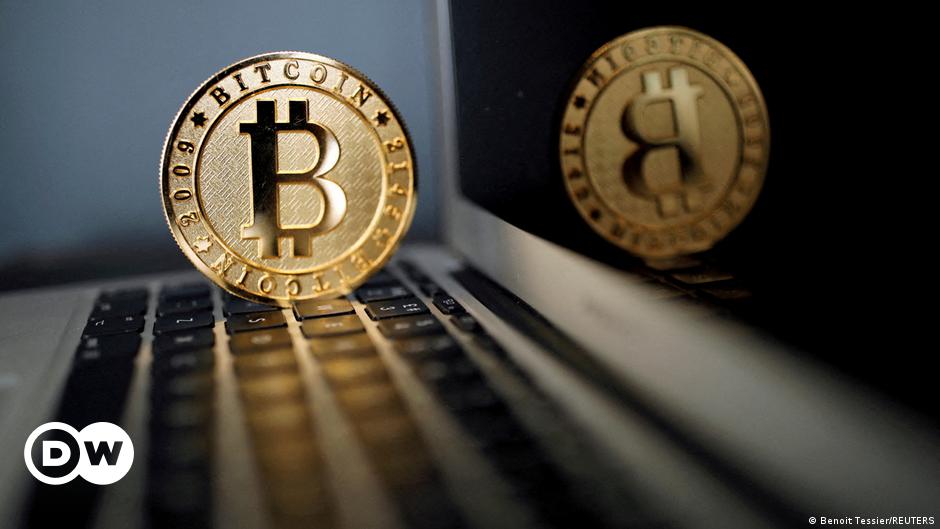Germany: Police seize bitcoins worth €2 billion::German authorities have seized 50,000 bitcoins, worth some €2 billion, in what could be the largest seizure to date in the country.
Update: Valuation now only at $50k.
If this sounds like a big number, keep in mind this is roughly 0.02% of the Bitcoin in circulation. The eventual total supply of BTC is 21 million BTC. Bitcoin’s market cap is around 800 billion USD, which puts it in the top 25 countries by GDP. Next to switzerland, bigger than Norway, Sweden, Vietnam or Israel. (GDP isn’t the same as market cap, just trying to give an example for scale).
The market cap is bullshit. It doesn’t work like stocks.
You have to ask how much this is in relation to the volume actually being traded. If(!) this is sold, will people actually pony up 2 billion?
I don’t trust any of the numbers coming out of that industry, so IDK.
Why not? It’s a thing people can buy and sell on the open market just like stocks or futures or whatever. There are dozens of exchanges you can use all around the globe that publish their data openly, that is where average price and market cap comes from, just like a stock. Those coins being sold on exchanges and the prices they are being listed are are determined by real people (or companies or whoever) who own Bitcoin. They set the price they are willing to buy/sell at. The protocol doesn’t sell any itself, there’s not some massive reserve waiting to be sold.
If one exchange is fudging the price, that creates an arbitrage opportunity which is immediately exploited by trading bots. We are well past the point of the market price being found on exchanges somehow not being real, we passed that point like a decade ago. One can argue how real the reported trading volume is, but price per coin and therefore market cap? Nope.
A stock is a promise/asset, enforced by the legal system, saying you own part of a company. You can trade it with other people and use it to vote on shareholder resolutions. Bitcoin is a currency/asset whose ownership and system of rules is enforced by a decentralized protocol. You can trade it with other people and use it as a currency/use it to send value from one place to another. You could use stocks as a currency, of course, they’re just kind of cumbersome to use for that purpose.
re the 2 billion: Massive buys and sells change the price just like with stocks or other assets. The market cap is not the real amount you would pay if you tried to buy (or sell) all the available supply because that number is uknowable. It’s just the current value of one unit of the thing times the number of units in existence.
Good question. So let’s look at how stocks get their value.
A company sells shares to get funding. Say, you want to make microwave dinners. You need to hire people, an industrial kitchen, packaging and packaging machines, ingredients, and probably a whole lot more. The company takes in revenue from selling the dinners, which pay for the running costs. Anything above that may be reinvested or turns into profit. The profit is paid to the stock-owners to pay them for their investment.
Now the question is: What is the value of a stock?
Imagine you take out a loan. That gives you money right now, in the present. You pay back the loan with the money that you get from your stocks; your share in the profit. Now imagine that the company goes out of business (and the value of the stock becomes $0) right as you are done paying back the loan + interest. Then that loan was the present value of the stock.
In theory, the value of a share is the present value of the future money that you get paid. Of course, one cannot know how much that is, so this is useless for actual investing. Still, the market price of a share should be the best guess of people with money. If the stock is trading higher than someone’s guess, they sell. If it’s lower, they buy. So the market cap should reflect the future profits.
But what’s the value of a crypto-coin like bitcoin?
Let’s start by thinking only about a coin being used to transfer money. And to make it easier, let’s say that coins are only exchanged for money once a day.
Say people want to transfer 10 million USD each day. The senders buy coins for 10 million USD. They don’t care how many coins that gets them, only that the coins represent 10 million USD. If there are 2 million coins being sold on the market, then each coin must transport 5 USD and that will be the market value.
New coins are constantly being “mined” to pay for the upkeep of the system. Let’s say that’s 100,000 coins per day.
The intended receivers of the 10 million USD sell their coins to get the money. The miners also sell their coins to pay their bills. So the next day you have 2 million + 100,000 coins on the market. The senders again want to transport 10 million USD, so they buy the 2,100,000 coins on the market. The market value of a coin is now ~4.76 USD. Adding more coins lowered the value of the coins. That is inflation. The “missing” money goes to the miners to keep the system running. That’s not a problem for senders and receivers. Transferring money costs money, however you do it. (That crypto is an extremely expensive way to do this, is one underlying reason why it has no adoption as a payment system in the normal economy.)
So far, you wouldn’t expect anyone to store or “hodl” coins. The value is just going down. But obviously, this is only true as long as the amount of USD to be transferred stays constant. If the system is more widely adopted and more money is transferred (outpacing the inflationary effect of the newly mined coins), then each coin has to transport more USD and the “value” goes up.
Now, if you believe that adoption continues to grow, it becomes a reasonable strategy to stash some coins to sell them later at a higher “value”. Maybe the problem is already obvious, but let’s continue to take it slow.
So, let’s say, it’s a bit later. There are 15 million coins and they are to transfer 100 million USD. The market price of a coin is now $6.67. (Let’s also say that there are no more coins being mined and the upkeep is paid some other way.) Now we bring in some venture capitalists. One day, they buy coins for an additional $50 million. Now the coins trade at $10 per coin. 15 million coins bought for $100 million + $50 million, right?
The VCs now have 5 million coins. But note where the money went. It went to the transfer receivers when they sold the 15 million coins for $10 each. They got a windfall profit. That’s how it goes in crypto. All the money that people “invested” by buying coins is gone. It was either used to pay miners/for the system upkeep, or early adopters took it and ran. It’s all gone. That’s the big difference to shares.
If the VCs sell their coins again, they lose. Because when there is only 100 million USD in the market for 15 million coins, they would only get 6.67 USD per coin. The money that they spent is gone. If they want to make a profit, new money has to come from somewhere. There are only 2 ways to achieve this.
One is continuing adoption. If more money were to be transferred, with the same number of coins, the price goes up. They can siphon off some of that money by selling into that market. But that lowers the price again, so that only yields a profit if adoption increases enough.
The other is that someone else also removes coins from the market. If there are fewer coins for the same (or a decreasing!) amount of money being transferred, then the market price will also go up. (In this scenario, too, they would be siphoning off money that other people are trying to transfer. The cost of transferring money would be increased for no very good reason; not a great feature in a payment system.) But note that this, too, lowers the price again. That only yields a profit, if “hodlers” sequester the coins sold by the VCs for a higher price than the VCs paid.
I’m not saying this is a Ponzi scheme because everyone has heard that already.
So that’s it. If you want to know the effect of 50k bitcoin on price, you need to look at the trading volume (minus wash trades): How many bitcoin are actually “in use”? You also need to know how many of these coins will be promptly removed from the market by “hodlers”.
The total supply is 21 million. But a lot has been lost due to people losing their keys.
How much is difficult to measure, but you can probably take 20% off that number and be somewhat safe.
True. There are some pretty good effort estimates out there, idk what they are, but there are definitely some lost keys.
Woah! 48000 bitcoins!
This is the best summary I could come up with:
German law enforcement authorities said Tuesday they seized nearly €2 billion ($2.17 billion) worth of bitcoins in the eastern state of Saxony.
The Saxon State Criminal Police Office said the seizure of 50,000 bitcoins could be the biggest to date of its kind in Germany.
Police said they were investigating two men, aged 40 and 37, who are suspected of running a piracy website until the end of 2013.
Authorities allege the men bought bitcoins from the money they earned from the portal.
The seizure came after the “accused voluntarily transferred” the bitcoins to an official wallet of the Federal Criminal Police Office (BKA), police added in a statement.
The BKA did not provide further details about the transfer, but investigators cited by German news agency dpa said no decisions had been made regarding cashing in the bitcoins.
The original article contains 174 words, the summary contains 130 words. Saved 25%. I’m a bot and I’m open source!
Its decentralised blah blah blah and yet the government took it.
They handed over their own BTC over to the government. If you have the private keys, you control the coin. If you don’t, no amount of money or guns can make that coin move thanks to math and physics. However, a $5 wrench rammed repeatedly into your head may make you divulge those private keys. Strength of encryption is rarely the weakest link in any modern cryptographic system. But that wrench used on anybody who doesn’t know the keys? Useless. It’s pretty powerful stuff in that regard.
There’s always a relevant XKCD.
I don’t know what I’m talking about
This u?
No?
That is a weird way of admitting that you rushed to the comment section instead of, you know, reading the article.







